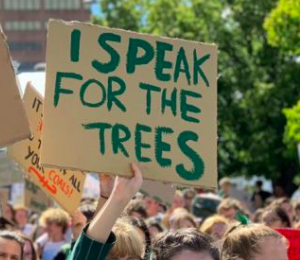For an alternative viewpoint, see “Point: Earth Day Should Be Retired.”
Black and Brown, Latinx/Latine and Indigenous Peoples, new Americans, and migrant workers have been stewards of these lands for centuries. But, the modern environmental movement as we know it found its footing in the United States with the first Earth Day in 1970 and the founding of Greenpeace in 1971.
After worsening air and water pollution for the sake of economic growth like we see in the River Parishes of Louisiana, and the watershed publication of Rachel Carson’s New York Times bestseller “Silent Spring” in 1962, many believed it was time for a change. It was time for a movement.
In the decades that followed, we’ve seen some of our most important environmental legislation passed: updates to the Clean Air Act and the creation of the Clean Water Act and the Endangered Species Act, and the establishment of the Environmental Protection Agency. We’ve also seen broken commitments to international agreements, unprecedented lobbying and monetary efforts to keep fossil fuel enterprises lucrative for shareholders, and disinformation campaigns to keep business as usual — all while the climate crisis unfolds in front of our eyes.
Earth Day serves as a useful benchmark to remember where we’ve been, but more important, a beacon as to where we need to go.
While nearly everyone knows about Earth Day, the systematic changes it was supposed to catalyze have continually been delayed. Today, we are seeing even more existential threats to our lives and livelihoods due to the global climate crisis. Scientists are sounding the alarm, yet governments have rolled back environmental protections, are failing to live up to the Paris Agreement, are dragging their feet in declaring a climate emergency, continuing to sacrifice the health and safety of communities, and failing to deliver a clean energy future we need to secure a livable future.
But it is not too late. The most recent U.N. climate report clearly shows that we have the solutions to meet the Paris Agreement goal of limiting warming to 1.5 degrees Celsius, which would prevent the worst effects of the climate crisis.
What is sorely lacking is the commitment and action from governments, the financial sector and corporations to deploy these solutions at the scale and speed required. A big reason for this is climate disinformation that continues to spread on social media channels, blatant greenwashing from corporations, as well as politicians prioritizing the needs of corporations over the people they were elected to serve.
Earth Day is a day where millions of people can demand our public leaders prioritize people over profits and hold them accountable; to be guided by science and do what is necessary to preserve the planet we all call home. It is also an opportunity to learn how to spot climate disinformation and false solutions that serve as nice talking points while companies increase emissions.
There will undoubtedly be corporations announcing new net-zero goals on Earth Day. This is a distraction from what we should actually focus on, which are total emissions reductions. While net-zero sounds great, it doesn’t mean companies will stop polluting and the pledges are often too vague and fail to detail concrete plans. Net-zero is a way for companies to continue to pollute and, as we’ve seen with the use of carbon offsets, it does not translate into real emission reductions. Put simply, these pledges are too often just corporate attempts to pass the buck and sacrifice people’s health while hoping that others will compensate for their destructive practices instead of working to reduce the amount of pollution they create.
We have less than a decade to slash around half of global emissions if we want a livable future. I fight for this future for my family in India, and the flooding, droughts and pollution they already experience that will only worsen if we don’t take action to reduce global emissions.
We have a chance to avoid the extinction of humanity, but we need all hands on deck. Instead of wasting time announcing half measures and smoke and mirrors, governments and corporations must treat everyday like it is Earth Day and aggressively act to meet the demands of science and justice.

